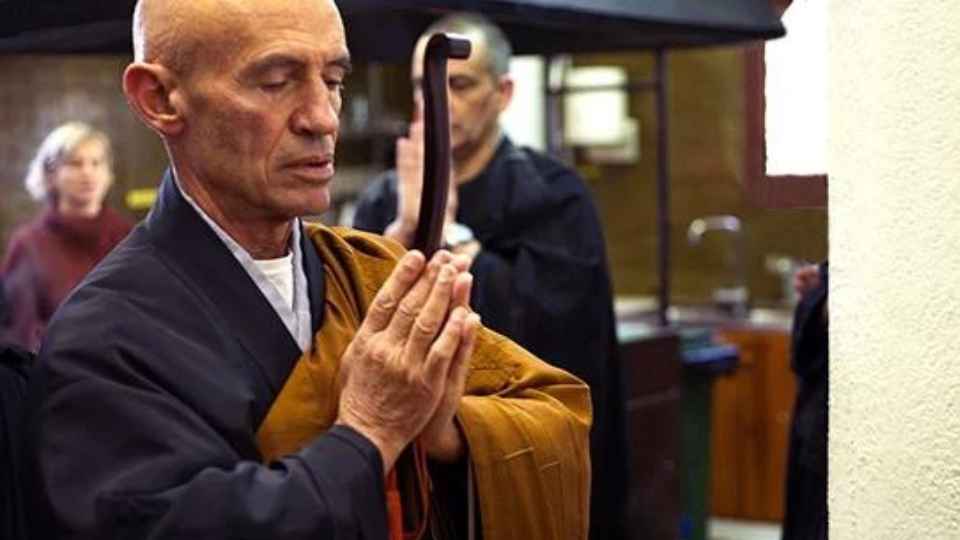Roland Yuno Rech, born in 1944, graduated from the Paris Institute of Political Studies and holds a DESS in Clinical Psychology from the University of Paris VII. After an initiatory journey to the Far East, he discovered Zen practice at a temple near Kyoto and decided to return to France to follow the teachings of Master Deshimaru, becoming his disciple from 1972 until 1982 (the year Master Deshimaru passed away).
Following his advice, he resumed his executive career in industry, which allowed him to experience Zen practice in daily, economic, and social life. After the death of Sensei, Roland dedicated himself primarily to Zen practice and teaching within the framework of the International Zen Association, where he served as president until 1994.
In 1984, Roland Yuno Rech, Stéphane Kosen Thibaut, and Etienne Mokusho Zeisler, all close disciples of Taisen Deshimaru, received the Dharma transmission (Shiho) in the Soto Zen tradition from Master Niwa Rempo Zenji, thus recognizing Taisen Deshimaru’s mission in Europe.
He currently teaches at the Gyo Butsu Ji temple in the city of Nice, France, where he offers Buddhist teachings to spread Zen Buddhism applied to daily life. He leads sesshins in various places across Europe organized by dojos and groups of the ABZE. In 2007, he founded the Zen Buddhist Association of Europe, where his followers from across Europe are enrolled.
Roland Yuno Rech discovers zazen at Antaiji
In 1971, Roland Yuno Rech left Europe seeking a path that would give meaning to his life, as both politics and Catholicism had disappointed him. The Christianity of his childhood only offered beliefs without direct access to its values, and politics, corrupted by ego and power, always failed to fulfill its promises. Upon discovering zazen at Antaiji, his search for meaning disappeared, replaced by a trust in the Zen way.
“[Someone] gave me the address of a sesshin that was being held at a nearby temple, so I went there. A monk introduced me to zazen in two minutes, taught me the posture, and explained that I should let thoughts pass. Thanks to his advice, I practiced for an hour inside the dojo, and that was enough to trigger a true inner revolution.” (Rech, 2000, p. 20)
“After that morning practice, there was breakfast, and I asked to continue the sesshin. They told me it wasn’t possible because there was no more space. I was so determined that I told them that, whatever happened, I wouldn’t leave and that I would sleep right there. After a while, the roshi finally asked me, ‘but what do you really want, to be here or to practice zazen?’ The place didn’t matter to me; what I wanted was to keep practicing. Then the roshi told me I could continue my practice at another temple. He gave me the address with a letter of recommendation for me to go that very day.” (Rech, 2000, p. 23)
Encounter with Taisen Deshimaru
Although Roland Yuno Rech didn’t plan on continuing his practice in Japan, when he heard about a Zen master in Paris, Deshimaru, he decided to go and meet him. After a long journey, their first encounter was during a practice session where Deshimaru corrected his posture. His first experience with zazen was profound, a feeling of fullness in the present. However, his first zazen with Deshimaru was simpler and more practical, focusing on returning to the normality of body and mind, with nothing special.
“When I discovered the practice of zazen at Antaiji, my question about the meaning of life disappeared, replaced by a joyful trust in the Path that was unfolding before me. I didn’t want to continue practicing in a temple in Japan. But when I heard there was a great Zen master in Paris, who was very strong and very funny, I immediately decided to go meet him.” (Rech, R. 2022)
After an endless journey on the Trans-Siberian, I finally met Master Deshimaru, who was leading the Zen practice week in Zinal. My first contact with him was his knee in my back and his hands pulling my shoulders back to straighten my posture. (Rech, R. 2022)
My first zazen at Antaiji plunged me into a great whirlpool from which I emerged from the bottom, experiencing a here and now where nothing was missing or superfluous, except the risk of becoming attached to it. My first zazen with Sensei was more down-to-earth: a return to the normal conditions of body and mind, as he continuously taught us: nothing special. (Rech, R. 2022)
References
RECH, R., 2000. Monje zen en occidente : conversaciones con Romana y Bruno Solt. Lleida: Milenio. ISBN 8489790566.
RECH, R., 2022. “Pour les 40 ans de la mort de Maître Deshimaru à La Gendronnière“. abzen.eu

